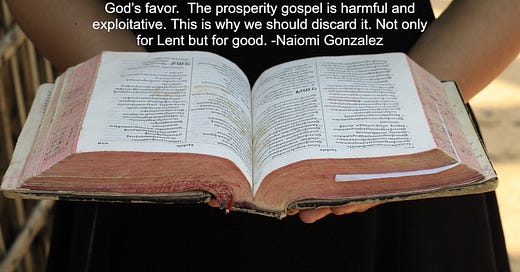Lent Post 1: Giving Up the Prosperity Gospel
Yeah, technically this post is late...but...time is just a construct especially during a pandemic, right?
When many American Christians think of the prosperity gospel, they think of its most extreme iterations. They think of the Evangelical preachers that are multi-millionaires, yet constantly pressure their congregation for more money. They think of preachers that hit up with their congregations for the funds to buy a private jet (or two). They think of preachers who explicitly say, “if you buy this product of mine and sow a seed of x amount of money, God will bless you tenfold," and of course they then provide “testimonies” from congregation/audience members, claiming that after giving that ministry a certain amount of money they suddenly received the lucrative job they had been praying for or they were healed from a dangerous form of cancer.
Let me be clear, these preachers and their ministries are exploitative and harmful, and they need to be shut down. They twist the gospel to fit their own greedy needs. They transform the gospel from a message of liberation to the poor, the oppressed, and the captive to a message that endorses economic manipulation and exploitation. These preachers should be called out and any platform they have needs to be dismantled.
However, the prosperity gospel is not limited to its more extreme versions. In fact, its more subtle forms have infected the beliefs of Christians from all walks of life: from the poor to the middle class, to the rich. Christians of various racial and ethnic backgrounds and from numerous denominations have endorsed more subtle forms of the prosperity gospel, and they remain completely unaware of how they are propagating a faith that oppresses and destroys rather than liberates and creates.
This subtle form of the prosperity gospel isn't as crass as the more extreme and explicit forms. It often doesn't say outright: "if you give this church/preacher/ministry $1,000 God will bless you with wealth or health." Instead, it says, “I am middle class or financially stable because God blessed my hard work.” It buys it to the myth of the American dream, which says that if I work hard enough, I will have a job that pays a living wage, I will have adequate health insurance, I will be able to have enough to eat, and misfortune will not harm me.
This quieter form of the prosperity gospel hyper focuses on the individual’s ability to shape their life. If a person is poor, loses their job, or works in a minimum wage job, they are portrayed as having made bad decisions and not working hard enough to improve their lot in life. This version of the prosperity gospel tries to avoid explicitly turning faith in God into a simple monetary transaction: do and believe the right things and you will be blessed, but in practice, it still ties material possessions and financial stability with being a good Christian.
Instead of focusing on larger systemic issues such as the failure of the minimum wage to keep up with inflation, multi-million and billion-dollar corporations who do not pay adequate taxes, the lack of a national safety net, and the injustice of tying health care to employment, this version of the prosperity gospel overemphasizes the need for poor and struggling people to just "act" better and smarter. Even those who grew up in poverty and yet have managed to achieve some level of financial stability often adhere to this form of the prosperity gospel. “I made it, why can’t they?”
Even Christians who claim to be progressive theologically and politically fall into this trap when they decide to highlight their “blessings” in an attempt to be more grateful. They highlight how they have been blessed with a stable job, housing, health care, without recognizing that these blessings aren’t a result of divine intervention but are often a result of some form of privilege.
Of course, that’s statement is not meant to say that they didn’t work hard to get even that measure of stability or that they were just handed a stable job, health care, or housing. Of course not. They may have grown up from poverty and progressed enough to have some sort of economic safety net.. But one can acknowledge that one has worked hard for one’s life without denying that our economic system is built to enable a small number of people to succeed while condemning a large number of others to a life of desperation and struggle.
Acknowledging the reality of our current economic system doesn’t negate one’s own hard work but it recognizes that there are millions of other people who work just as hard but who because of racism, ableism, and other forms of systemic injustice are denied even the opportunity to achieve any level of financial stability.
The pandemic has made it abundantly clear that this economic system is not sustainable and that the prosperity gospel, in all of its versions, needs to be dismantled. This pandemic has seen people who were solidly middle class lose their jobs and scramble to qualify for unemployment. It has exposed the need that our society has for delivery people ( To say I have relied on USPS, UPS, and FED-EX drivers a lot during this pandemic is an understatement), grocery store workers, Uber Eats/Door Dash/Grubhub workers, daycare workers, etc. And yet people that work these jobs, in many cases, continue to be denied a living wage and health care benefits.
The prosperity gospel-in its extreme and subtle forms makes an idol out of material wealth and economic stability. It turns faith in God into a simple transaction and it disguises privilege and luck as evidence of God’s favor. The prosperity gospel is harmful and exploitative. This is why we should discard it. Not only for Lent but for good.



